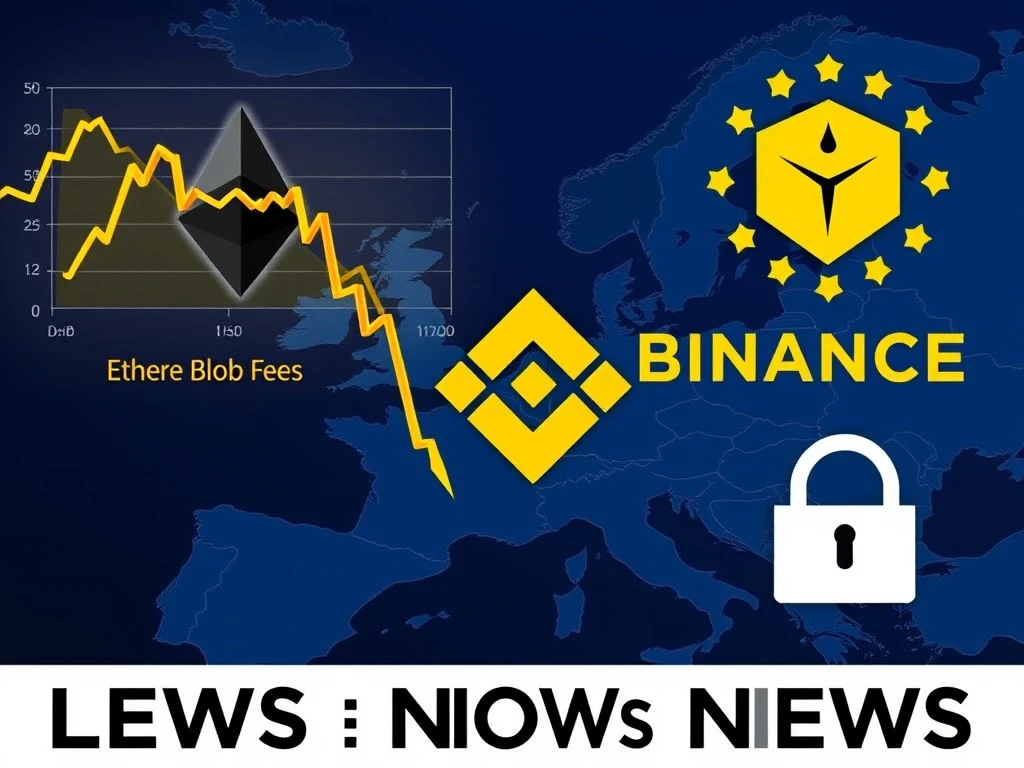Breaking Crypto News Today: Ethereum Blob Fees Plunge, Binance Halts USDT, and Privacy Pools Launch

Want to stay informed in the fast-paced world of cryptocurrency? Look no further! Today’s crypto landscape is marked by significant shifts and developments. From Ethereum’s revenue streams experiencing a notable dip to Binance making strategic adjustments in Europe, and the emergence of innovative privacy solutions, let’s dive into the crypto news today that matters.
Ethereum Blob Fees Plunge to 2025 Lows: What’s Happening?
Ethereum’s income from blob storage, a crucial component of its layer-2 scaling solution, has reached its lowest point in 2025. Specifically, weekly “blob fees,” which represent Ethereum’s earnings from layer-2 chains, have dramatically decreased. Data from Etherscan reveals that in the week ending March 30th, Ethereum’s blob fee revenue was a mere 3.18 ETH, roughly $6,000 USD as of April 1st. This marks a staggering 73% decrease from the previous week and over a 95% plunge from the week ending March 16th.
Key Points to Understand the Ethereum Blob Fee Drop:
- Dencun Upgrade Impact: Ethereum’s Dencun upgrade in March 2024 shifted layer-2 transaction data to off-chain “blobs.” While this lowered user costs, it also initially slashed Ethereum’s fee revenue by up to 95%, according to VanEck.
- Uneven Growth: Blob fee income has been volatile. After peaking near $1 million in November, it has recently seen a sharp decline.
- Source of Income: Blob fees are a primary revenue source for Ethereum from layer-2 scaling chains, making this drop significant for the network’s economics.
Why is this important? This trend raises questions about the sustainability of Ethereum’s revenue model and the long-term impact of the Dencun upgrade on its financial health. While user costs are down, the drastic reduction in blob fees warrants close monitoring to see how it affects Ethereum’s development and future upgrades.
Binance USDT Delisting in Europe: MiCA Compliance in Focus
In a move driven by regulatory compliance, Binance has stopped offering spot trading pairs for Tether’s USDt (USDT) within the European Economic Area (EEA). This action is part of Binance’s broader strategy to adhere to the Markets in Crypto-Assets (MiCA) regulations in Europe. Binance USDT delisting affects spot trading, but EEA users can still hold USDT and trade it through perpetual contracts.
Understanding Binance’s EEA Changes:
- MiCA Compliance: The delisting is to comply with MiCA rules, which aim to regulate crypto assets within the European Union.
- Phased Approach: Binance announced in early March its plan to delist non-MiCA-compliant tokens by March 31st, aligning with a local requirement for delisting by the end of Q1 2025.
- Not Alone: Binance is not the only exchange making such changes. Kraken, for example, has also restricted USDT spot trading in the EEA.
- Affected Tokens: Besides USDT, Binance has also delisted spot trading pairs for DAI, FDUSD, TUSD, USDP, AEUR, UST, USTC, and PAXG in the EEA.
What does this mean for European crypto users? For users in the EEA, this means adjustments to their trading strategies. While USDT spot trading is no longer available on Binance, perpetual contracts remain an option. This highlights the increasing influence of regulatory frameworks like MiCA regulation on crypto exchange operations and user access in Europe.
Privacy Pools Launch: A New Era for Ethereum Privacy?
Exciting developments in Ethereum privacy! Privacy Pools, a new privacy tool, has been launched on Ethereum, offering users the ability to conduct private transactions while demonstrating that their funds are not associated with illicit activities. This semi-permissionless tool, developed by 0xbow.io, has garnered significant attention and support, including from Ethereum co-founder Vitalik Buterin, who publicly endorsed and used the platform.
Key Features of Privacy Pools:
- Association Sets: Privacy Pools utilize “Association Sets” to group transactions within anonymous pools, enhancing privacy.
- Screening Mechanism: A screening test is implemented to filter out transactions linked to malicious actors, such as hackers and scammers, aiming to balance privacy with security and compliance.
- Vitalik’s Backing: The public support and early adoption by Vitalik Buterin lend credibility and visibility to the project.
Why are Privacy Pools significant? Privacy has been a long-standing concern in the crypto space. Privacy Pools represent a step towards enabling private transactions on Ethereum while attempting to mitigate risks associated with illicit activities. This innovative approach could pave the way for broader adoption of privacy-preserving technologies in the crypto ecosystem and address regulatory concerns surrounding anonymous transactions.
Looking Ahead in Crypto
Today’s crypto news underscores the dynamic and evolving nature of the cryptocurrency landscape. Ethereum is navigating revenue model adjustments, Binance is adapting to regulatory pressures in Europe, and innovative privacy solutions are emerging. Staying informed about these trends is crucial for anyone involved or interested in the crypto world. As the industry matures, expect to see continued adaptation to regulatory environments and ongoing innovation aimed at enhancing user experience and addressing key challenges like privacy and scalability. Keep watching this space for more crucial updates!








